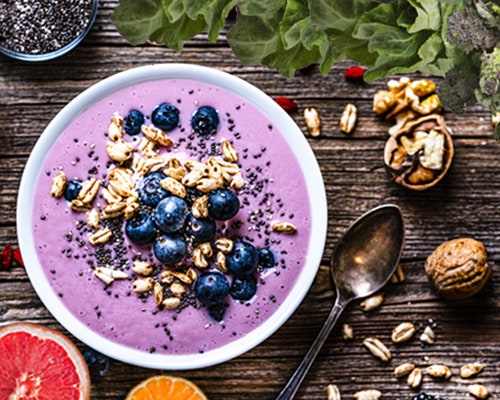Are Healthy Oils a Big Fat Lie?
- 2/18/21


What’s cooking in the world of cooking oils? Oils add zesty flavor to dressings and marinades, a crisp crunch to sautés and stir-fries, a brown sear to chicken and fish, and moistness to muffins and breads. They help your body absorb nutrients from food and give you a satisfying sense of fullness. But with so many oils available, it’s tough to know which to choose and use. While some select their oil based on the type of cooking or recipe, many health-minded cooks say, “Fat chance!” This pantry staple has come under fire with some believing that certain oils may be better for your health and heart, while others may be a recipe for later medical problems. Take a look at which oils to buy—and which to pass by—in the grocery store.
Warm Up to Expeller Cold-Pressed Oils
The problem with most cooking oils is that they’re horribly overprocessed with high heat and chemicals that stay in the bottle and your body, including a neurotoxin called hexane. Along with altering the oil’s fatty acid to what your brain thinks is a harmful trans fatty acid, these oils are highly inflammatory, which can lead to cholesterol and other inflammatory issues. The healthy alternative is expeller cold-pressed oils, which aren’t overprocessed and don’t contain toxic chemicals. With greater demand for these healthier oils, you won’t be hard-pressed to find expeller cold-pressed oils.
Choose One of the Single-Source Oils
As their name suggests, single-source oils come from a single farm or source of origin. Single sourcing increases the purity of the oil and eliminates the chance of a better oil being deceptively diluted with lower-quality vegetable oils. Knowing that your cooking oil comes from a single source also offers the assurance of transparency from the producer and consistency in the quality.
Strike Gold
While cooking oils are a kitchen go-to, it’s important to go to the right ones for your health. With the three healthiest oils, look for the distinction of “extra virgin” on their labels because these oils are minimally processed, don’t involve the use of chemicals and maintain their nutritional value. Reach for these healthy oils every day and any time:
- Extra Virgin Coconut Oil – While the gold standard of coconut oils isn’t gold in color, it looks better for your body than most other fats. Even though it’s a saturated fat, it’s considered a “good” saturated fat because it contains lauric acid, which can help lower your bad cholesterol and raise your good cholesterol. Lauric acid also has antimicrobial properties.
- Extra Virgin Olive Oil – You don’t need a very expensive one for everyday sautés and baking, but you can’t afford not to choose a single-source oil. Feel free to splurge on a really good, extra virgin olive oil to finish dishes with flavor.
- Extra Virgin Avocado Oil – Avocados are good for more than toast. Extra virgin avocado oil is a heart-healthy fat that can help lower your cholesterol. Its neutral flavor and ability to handle high temperatures make it welcome at any meal.
Grease Gone Bad
The cooking oils that most people use on a daily basis are some of the most harmful. That’s because they’re enormously overprocessed at very high temperatures using toxic hexane to extract the oil. Their inflammatory nature and abundance of omega-6 fatty acids can contribute to inflammation in your body, which can cause a host of health conditions. Some also come from GMO plants. When you’re picking your pantry oil, leave these at the store:
- Canola Oil
- Soybean Oil
- Peanut Oil
- Corn Oil
- Sunflower Oil
- Safflower Oil
There are many surprises in store when shopping for cooking oils. While the golden oils are clear to the eye, it isn’t always clear what’s lurking within the liquid. By choosing one of the three “good” cooking oils, you’ll be good as gold.




